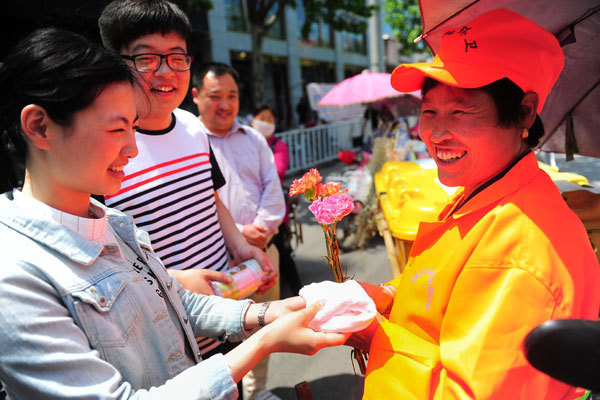'90s generation living 'substantial' lives
Updated: 2015-05-04 10:13
By LUO WANGSHU/WANG HONGYI(China Daily)
|
||||||||
 |
| Volunteers from Fuyang Teachers College present flowers and a towel to a sanitation worker in Fuyang, Anhui province, on Thursday, one day ahead of International Labor Day.[Wang Biao/China Daily] |
Survey sheds new light on attitudes leading to happiness
Although the generation born in the 1990s has been widely labeled as selfish, lazy and money-worshipping, recent research has found otherwise, portraying the generation as calm, rational, trustworthy and full of positive energy.
The survey of students born between 1990 and 2000 covered such topics as their political and social views, what they consider to be the top 10 controversial issues, and their ideal lovers. Many of the survey reports-there are about a dozen-were to be released for National Youth Day, which is Monday.
The survey, co-conducted by Fudan University's Web Communication Research Center and its Development Institute, randomly sampled the postings on micro blog service Sina Weibo of 1,708 students.
Students who were surveyed attend a range of universities, from vocational colleges to top universities.
Researchers drew what they described as a sketch of typical current Chinese university students based on a qualitative analysis of two years' worth of Weibo posts from the sampled students.
The report on the survey, which assessed the students' attitudes toward life, money and relationships and analyzed their dreams, pursuits and interests, described the post-'90s generation as living "comfortable and substantial" lives.
The survey found that the post-'90s generation is willing to pursue a comfortable life. About 27 percent of the university students sampled indicated that the most essential factor in a successful life is comfort, while 15 percent indicated that personal accomplishment is the most crucial factor and 10 percent believed having a happy family is most important.
The survey also found that besides pursuit of a comfortable life the post-'90s generation values diligence in work and believes that work can lead to success.
Additionally, the research found that the university students who were sampled paid little attention to public affairs or politics.
The survey report said that 80.9 percent of the topics discussed by the surveyed students in their micro blog postings had nothing to do with politics.
Regarding views on relationships, the post-'90s generation places more value on personality than appearance or family background, the survey found.
Huang Xuejia, a student at Beijing Foreign Studies University, exemplifies the diligence of the post-'90s generation.
Besides attending classes and doing homework, she spent four to six hours a day practicing her major, the Serbian language, in her first two years as a university student, the 22-year-old told China Daily.
Now a junior, Huang practices Serbian in internships. She said she earned about 1,000 yuan ($161) a month through part-time jobs and internships, or half of her monthly stipend.
According to the Fudan report, Chinese born in the 1940s and '50s have been called the generation of deficiency because of the hard beginning of the People's Republic of China, which was founded in 1949.
Those born in the 1960s and '70s are considered to be a generation that had adequate food and clothing.
The 1980s generation is considered to be the one that had sufficient food and clothing and enjoyed much better living conditions than the earlier generations.
Those of the post-'90s generation, according to the survey, not only live sufficiently, but they also are more tolerant and benefit from China's rapid development, which allows them to flourish.
Contact the writers through luowangshu@chinadaily.com.cn

 Historical photos of 56 nations in China (Part I)
Historical photos of 56 nations in China (Part I)
 World No.1 Ma wins first men's singles world championship
World No.1 Ma wins first men's singles world championship
 Ten photos you don't wanna miss during May Day holiday
Ten photos you don't wanna miss during May Day holiday
 The world in photos: April 27 - May 3
The world in photos: April 27 - May 3
 Fans dressed up to celebrate 'Star Wars Day' in Budapest
Fans dressed up to celebrate 'Star Wars Day' in Budapest
 China pavilion opens at Expo Milano 2015
China pavilion opens at Expo Milano 2015 New exhibition by Fondazione Prada offers new perspective on originality and imitation
New exhibition by Fondazione Prada offers new perspective on originality and imitation
 Mayweather beats Pacquiao by unanimous decision
Mayweather beats Pacquiao by unanimous decision
Most Viewed
Editor's Picks

|

|

|

|

|

|
Today's Top News
Los Angeles protesters confront Abe face to face
China becomes top source of immigrants to United States
Language contest wows judges
Arrest warrants issued in birthing center cases
Baltimore mayor lifts curfew 6 days after riots
More speculation in China's market as it's new
Consul general praises Beijing university to alumni
Manufacturing hub starts work on first zero-labor factory
US Weekly

|

|






